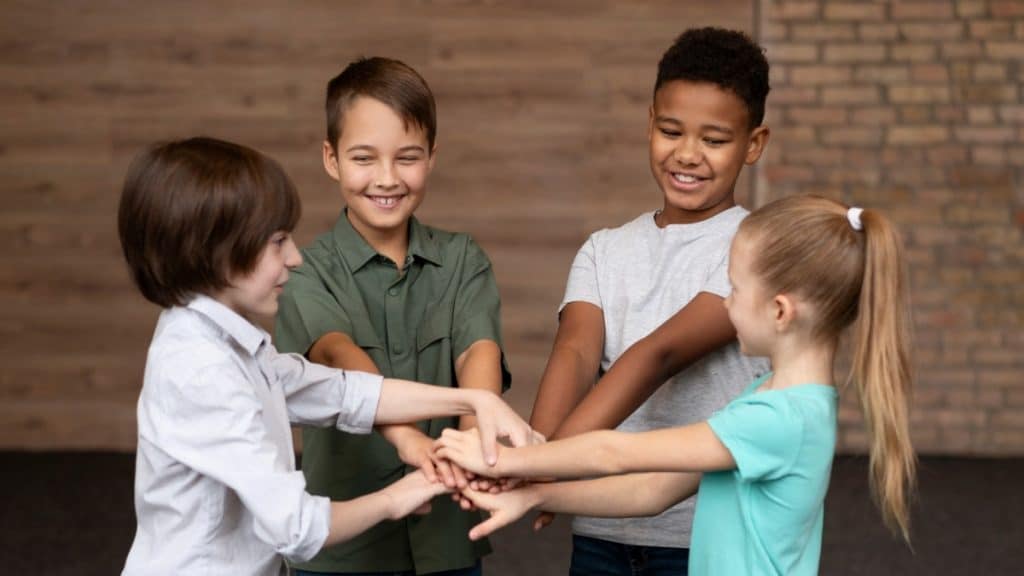Children’s social and cognitive development greatly benefits from these critical years. The preschool (Pre-K) setting introduces kids to their classmates for the first time, laying the groundwork for future social skill development. Building a strong social base during these teenage years is essential to fostering love, friendship, and cooperation. In this blog, we discuss the importance of developing social skills in toddlers and provide practical advice for parents and educators on how to support children at this crucial time of life development.
Understand the importance of social skills
Children’s ability to communicate in social settings depends on their social skills. These abilities are necessary not just for making friends but also for succeeding in both education and life. Preschoolers’ early social skill development establishes the groundwork for lifelong good interactions.
Creating a Positive Social Environment
In the Pre-K classroom, teachers have a significant impact on creating a pleasant social atmosphere. This entails outlining precise standards for conduct, encouraging inclusivity, and creating a sense of belonging. Little ones should experience safety and encouragement while they pick up the nuances of social interactions.
Encouraging Play and Cooperation
Play serves as a natural avenue for children to develop social skills. In the Pre-K setting, activities that promote cooperation and teamwork are instrumental. Children have many of opportunity to practise sharing, taking turns, and cooperating to achieve shared objectives through cooperative games, building projects, and art projects.
Teaching Empathy
Empathy is an important social skill that allows children to understand and express the feelings of others. Introducing empathy can be achieved through storytelling and discussions surrounding emotions. Utilizing books and activities that showcase diverse perspectives aids children in recognizing and respecting the feelings of their peers.
Modeling Social Skills
Adults and older peers serve as powerful role models for children. Teachers and parents should exemplify positive social skills through their own interactions. Demonstrating kindness, patience, and effective communication sends potent messages to young children about navigating social situations with grace.
Providing Social Opportunities
Children can practise and improve their social skills through structured social opportunities including playdates, group projects, and circle time talks. Through these encounters, kids can try out new behaviours, get insight from their interactions, and develop self-assurance in their social skills in a safe environment.
Addressing Social Challenge
It’s critical to acknowledge that social issues are an essential component of progress. Promoting candid dialogue around emotions and disagreements teaches kids how to listen and communicate with others. Working together with parents to resolve social challenges promotes a coordinated strategy to assist the child’s social development.
Building social skills in preschool is a collaborative effort between schools and parents. Both are crucial in forming a child’s social and emotional growth and in fostering an atmosphere that enables them to engage with others in productive ways.
Pre-kindergarten students’ social development is supported by schools in a variety of ways. Their primary responsibility is to create a friendly and inclusive learning environment in the classroom. This means ensuring that every child feels supported and comfortable, fostering a sense of community, and setting explicit expectations for behaviour. The foundation for sound social development is laid by this good environment. Schools also need to incorporate a social skills curriculum within their curricula. Teachers impart important skills to children through lessons and activities that are appropriate for their age, like teamwork, empathy, and effective communication. Structured group activities, peer interactions, and collaborative projects become invaluable opportunities for honing these social skills. Teachers act as role models for their students, modelling important social behaviours like tolerance and kindness so that kids can internalise these traits. Additionally, schools are essential in helping kids learn how to resolve conflicts and solve problems so they can handle social obstacles on their own. Lastly, maintaining open communication with parents is vital. Through regular updates, parent-teacher conferences, and workshops, schools keep parents informed about their child’s social progress and provide insights into areas that may require additional support. This collaborative approach ensures a consistent and reinforcing environment for children, fostering positive social development in the crucial Pre-K years.
In a child’s social development during pre-kindergarten, parents are essential. They serve as role models for positive behavior at home, reinforcing lessons learned at school. Parents actively contribute to social skill reinforcement through age-appropriate activities, fostering cooperation, discussing emotions, and promoting empathy. Consistency between home and school expectations is crucial, creating a secure environment for children to apply social skills consistently. In addressing social challenges, parents collaborate with teachers, sharing insights for tailored support. Promoting extracurricular activities helps people develop their social skills even more, completing the picture of a well-rounded person and enhancing basic education.
A child’s path to successful social interactions and good relationships begins with the development of social skills in Pre-K. An important factor in a child’s social and emotional development is their parents and teachers. A strong social foundation prepares kids for a lifetime of healthy interactions and relationships by helping them better navigate the complexities of the social environment.

